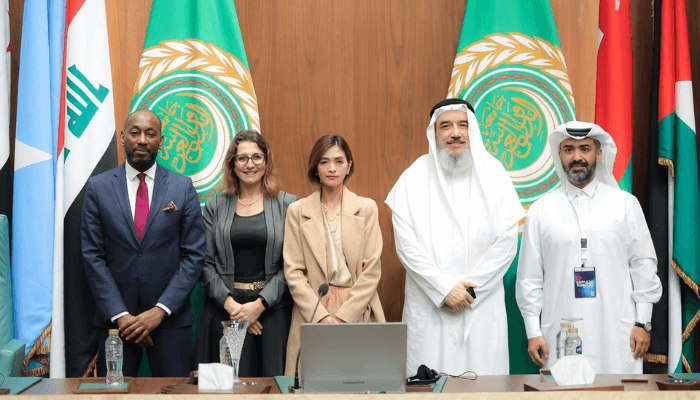Oduneye: Building the architecture of credibility across emerging markets
In Cairo, the marble corridors of the League of Arab States — once a stage for diplomacy — recently became the setting for a different kind of negotiation: one between innovation, capital, and credibility.
At the Ripple Summit, hosted by the AAST Entrepreneurship Center, policymakers, investors, and founders from across Africa and the Middle East gathered to confront a defining question: how do emerging economies make innovation investable?
Among the voices leading that dialogue was Gbite Oduneye, Managing Partner at ODBA, a London- and Lagos-based venture capital firm that is quietly reshaping how credibility is built into Africa’s innovation markets.
Read also: Rethinking Africa’s investment narrative: Why real businesses remain invisible to capital markets
“Investor confidence isn’t sentiment — it’s structure,” Oduneye said. “Liquidity follows credibility. And credibility must be engineered, not assumed.”
From inspiration to institution…
Oduneye’s message resonated across the summit — one that began with Ahmed Aboul Gheit, Secretary-General of the Arab League, calling for stronger systems to embed innovation into regional growth frameworks.
For Oduneye, it’s a philosophy that defines ODBA’s work: investing in technology founders who combine vision with verifiable progress, and building the institutional scaffolding that allows innovation to scale sustainably.
ODBA is an early-stage venture capital firm investing in founders who turn operational proof into market signal. Headquartered in London and Lagos, ODBA partners with ecosystems and investors to build credible innovation markets across Africa and the Middle East.
“We’ve had a decade of ambition,” he said. “The next decade belongs to those who can design accountability into their ecosystems — to those who understand that investor trust is earned, not assumed.”

A continental journey, a global thesis…
Over the past three months, Oduneye has engaged founders, investors, and policymakers across Tunis, Nairobi, Lagos, Cairo, and Kampala — a tour that reveals both the vibrancy and fragility of Africa’s innovation systems.
In each city, the patterns are familiar: creativity in abundance, but too often without the structural depth that global capital demands. For Oduneye, this isn’t an obstacle — it’s an opportunity to build the foundations that make markets durable.
Read also: Google, World Bank to build AI-powered public infrastructure for emerging markets
He describes it as a shift from narrative to numbers, from potential to proof.
“Proof is the new frontier,” he said. “The real innovation in emerging markets isn’t just product or technology — it’s credibility. Turning operational results into market trust is how we build enduring economies.”
Designing markets, not discovering them…
At ODBA, this mindset has become the firm’s organising principle. Beyond deploying early-stage capital, the firm partners with founders to strengthen governance, improve data transparency, and prepare companies for institutional-grade scrutiny.
That approach has made ODBA part of a new generation of African fund managers — investors who view themselves not only as financiers, but as market engineers.
“We’re not just funding companies,” Oduneye noted. “We’re helping build the frameworks that make those companies investable — frameworks that outlast any single fund or cycle.”
The Cairo signal…
The Ripple Summit was a reflection of this broader evolution. With panellists including Motaz Abuonq, Abdulla Al-Naimi, and Katrina Victoria Gumaya, and moderated by Chantal Sabbagh, discussions moved beyond entrepreneurship as aspiration to entrepreneurship as infrastructure.
The event’s organisers — Heba Alashry, Wael Eldesouki Bedda, and Yasmin Elhamamsy of the AAST Entrepreneurship Center — successfully brought together institutions from across the region to explore how public policy, private capital, and academic research can work in concert to drive sustainable innovation.
For Oduneye, the significance went beyond the event itself. “When a hall built for diplomacy starts hosting discussions on venture liquidity, it’s a sign that emerging markets are evolving,” he said. “We’re moving from inspiration to institution — from energy to architecture.”
A new southern arc of innovation…
Oduneye views Africa and the Middle East as part of a rising southern arc of innovation economies — regions where growth will increasingly depend on blending entrepreneurial energy with institutional discipline.
“The global economy is rebalancing,” he explained. “The next generation of growth stories will come from markets that can prove reliability at scale — not just ingenuity. That’s where Africa must lead.”
Read also: Meet Temitayo Peters, the CFA charterholder championing ethical finance in emerging markets
He cautions, however, that success will require patience and intentionality. “Markets don’t reward noise,” he said. “They reward maturity. If we build with discipline now, the next cycle will be defined by African credibility, not just African creativity.”
The decade of design…
Across conversations in Cairo, Nairobi, and Lagos, one message continues to surface — the next phase of Africa’s growth story will be written by those who design for trust.
“Africa doesn’t need another wave of startups,” Oduneye concluded. “It needs a generation of founders who treat credibility as infrastructure. That’s how we turn momentum into maturity — and stories into systems.”

